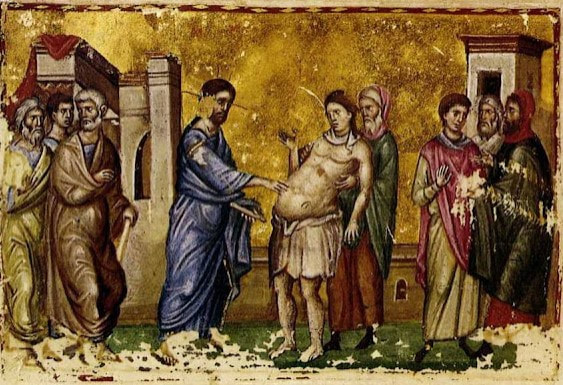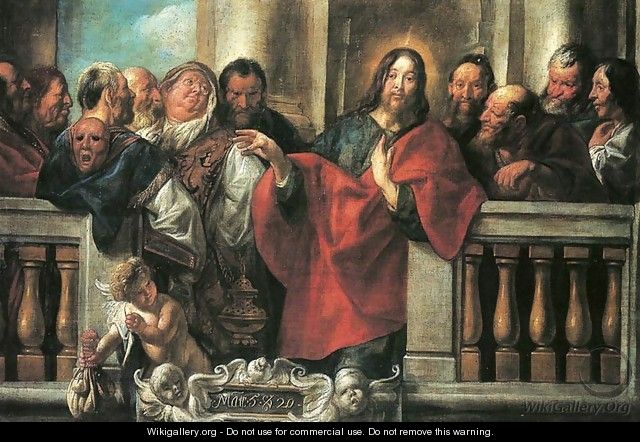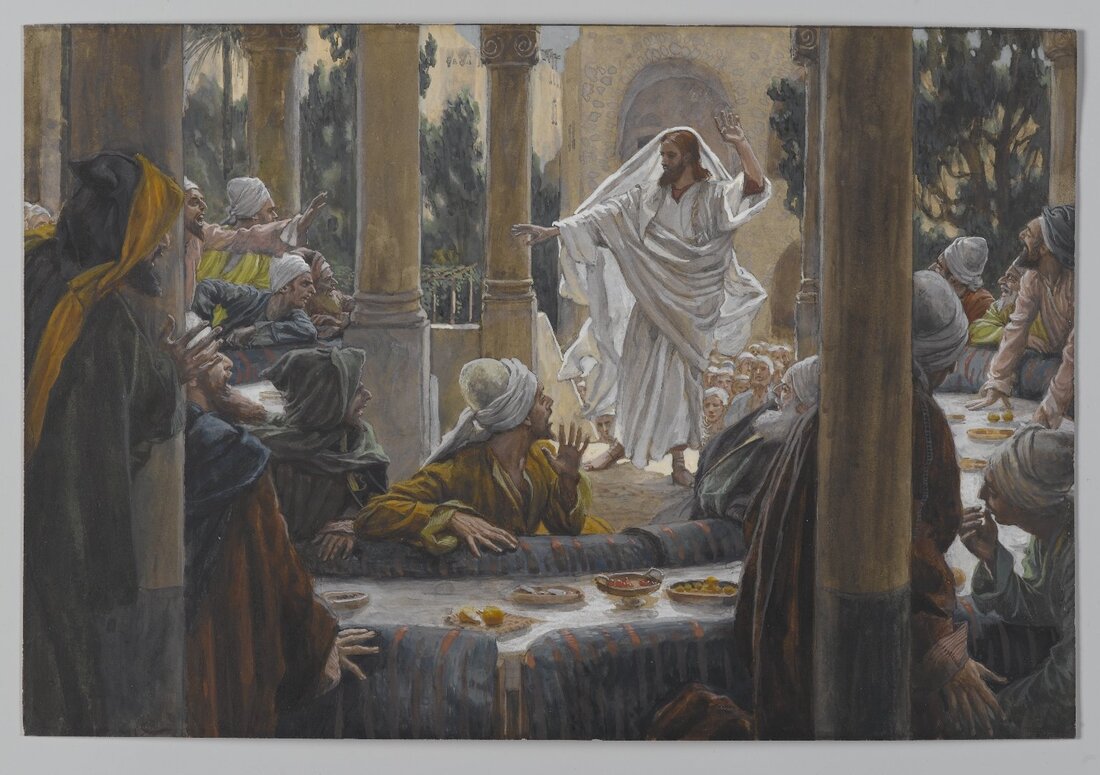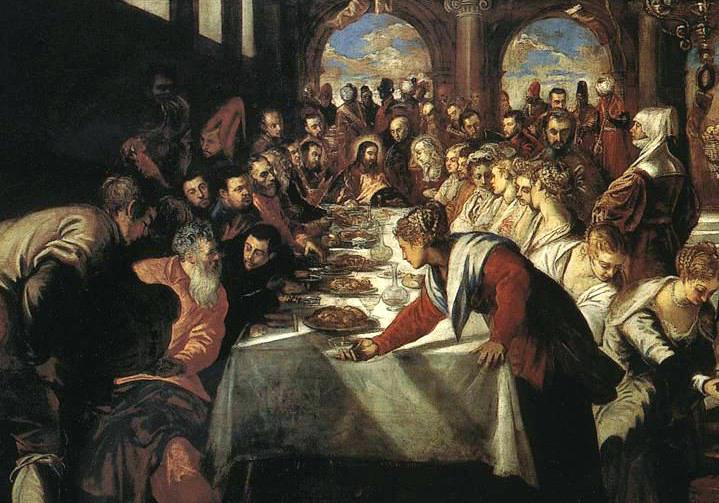Luke 14:1-14
Pastor James Preus
Trinity Lutheran Church
October 1, 2023
The leaders of the Pharisees invite Jesus over for dinner on the Sabbath, and in attendance is a man suffering from dropsy, a disease, which causes his body to bloat up. These Pharisees are experts in the law. And they watch Jesus closely to see whether He will do anything against the Law of Moses. But it is Jesus who quizzes these Pharisees concerning the law. “Is it lawful to heal on the Sabbath?” Jesus asks. The Law commands, “Remember the Sabbath Day, to keep it holy. Six days you shall labor, and do all your work, but the seventh day is a Sabbath to the LORD your God. On it you shall not do any work…” (Exodus 20:8-10a) So, the letter of the Law forbids work of any kind on the Sabbath Day. But there is a man suffering from dropsy here. Jesus can heal him. Is it lawful for Jesus to heal this man, even on the Sabbath? But wouldn’t healing be considered work?
The Pharisees remain silent. They do not want to say that it is lawful to heal on the Sabbath, because then they would lose their opportunity to condemn Jesus. But they do not want to say that it is unlawful, because they would seem heartless. But their silence betrays their lack of love. And so, Jesus, by asking this question and then going on to heal this man suffering from dropsy, proves what the law is all about: love.
The Ten Commandments are not eternal. God gave the Ten Commandments to the people of Israel through Moses on Mount Sinai in the spring of 1441 BC. Before 1441 BC there were no Ten Commandments. Yet, the Ten Commandments did not appear out of thin air. The heart of the Ten Commandments is much older. The heart of the Ten Commandments is Love. God’s eternal will for us is that we love the Lord our God with all our heart, soul, strength, and mind and to love our neighbor as ourself. God added the commandments, because of sin, that is, because we fail to love. The Ten Commandments are meant to teach us how to love.
The commandments are not eternal, but love is eternal. Love is God’s eternal and unchanging will. Love is the eternal quality of God. Jesus spoke to God the Father in John 17, “You loved me before the foundation of the world.” (vs. 24) The Father has loved the son from eternity. This is why He calls Jesus His “beloved Son.” (Matthew 3:17) God is so loving, that Scripture says, “In love He predestined us for adoption as sons through Jesus Christ, according to the purpose of His will.” (Ephesians 1:4b-5) So, God has loved us before He even created us. This is why Scripture declares, “God is love.” (1 John 4:16) Of course, the clearest expression of God’s love is when He sent His Son to die to make satisfaction for our sins (John 3:16; 1 John 4:10). Christ sacrificing Himself for our sake is the greatest example of love.
This shows us what the character of love is. Love does not envy or boast or insist on its own way (1 Corinthians13:4-5). Rather, love humbles itself and considers the needs of another before its own. In Christ’s demonstration of love for mankind, He humbled Himself by becoming obedient to the point of death on a cross, therefore, God has highly exalted Him (Philippians 2:8-9). So, we learn that love does not exalt oneself, but rather, to love another means to humble oneself for the sake of another. God did not give us the law to condemn others, but so that we might love each other.
Love is the fulfilling of the law. The goal of every commandment is to love. This is why Martin Luther begins the explanation for every commandment with, “We should fear and love God.” If you do not love, then you have broken the commandment, even if you have followed it to the letter. Likewise, as Jesus demonstrates, sometimes you must seemingly break the letter of the law in order to keep the spirit of the law. So, Jesus broke the letter of the commandment by working on the Sabbath, but He kept the spirit of the commandment by loving His neighbor and His God.
Now, people abuse this. Our sinful flesh looks for any excuse to satisfy its passions. People hear that love is the essence of the commandment, so they figure, well I can break the commandment as long as I love. So, people excuse fornication, adultery, and other forms of sexual immorality by claiming that they are doing these things in love. People will excuse divorce, theft, and gossip by claiming that they are simply doing the loving thing. We see this especially in the LGBT movement, which promotes all kinds of sexual perversion and physical mutilation in defiance of God’s clear prohibition against sex outside of marriage between a man and a woman and the clear teaching that God has made us male and female. They defy God’s clear word by saying they are being loving. But love does not rejoice in wrongdoing, but rejoices in the truth (1 Corinthians 13:6). You can’t use love as an excuse to break the commandment to satisfy your own selfish passions.
Perhaps nowhere is love used as an excuse for breaking the commandment more than the Third Commandment, “Remember the Sabbath Day by keeping it holy.” What does this mean? “We should fear and love God, so that we do not despise preaching and His Word, but hold it sacred and gladly hear and learn it.” Yet, people convince themselves that they still love God, even if they neglect to hear and learn His Word. They don’t think it is a sin to skip church, because they still love God. They don’t need to go to church to love God. But let’s examine this.
Are you showing love toward God when you choose to sleep, play, fish, hunt, go to a game, work, or do anything else while God’s people gather to hear and learn God’s Word? Is it loving toward God to place other things in your life as more important than hearing and learning His Word? Is it loving toward God to refuse to come and pray to Him and praise Him with His people? Jesus says, “If anyone loves me, he will keep my word...” (John 14:23). How can you love Jesus if you refuse to listen to His Word? Jesus promises to be with those who hear His Word. If you loved Him, would you not gladly hear His Word?
Others claim that loving God is only “between me and God.” But you do not only go to church to love God, but out of love for your neighbor. Scripture says, “Do not neglect to meet together, as is the habit of some, but encourage one another, and all the more as you see the Day drawing near.” (Hebrews 10:25) You encourage your fellow Christians by going with them to church, listening to God’s Word, praying with them, and standing in solidarity with them. When you go to church with others, you confess that you worship the same God, that you are willing to bear the cross with them which accompanies worshipping Christ. But when you miss public worship, you are discouraging those who go. Is it loving to discourage your brothers and sisters in Christ, by leaving them to worship alone?
Love is humble. Are you being humble when you miss church? When you think that you don’t need to hear the instruction from God’s Word; when you think you have nothing to learn from the pastor’s sermon; when you neglect saying with the congregation, “I a poor miserable sinner, confess unto You all my sins and iniquities…”? No, this is not humility, but pride, which keeps you from submitting to God’s Word, learning it, and confessing your sins before your God.
Refusing to hear God’s Word is also the most dangerous sin to commit! It is safer for your soul to commit adultery and murder than to despise God’s preaching and Word! When King David committed adultery with Bathsheba and murdered her husband Uriah (2 Samuel 11), God still listened to his prayer to cleanse him from his sins (Psalm 51:2), because David listened to the Word of God, which the prophet Nathan preached to him (2 Samuel 12). However, Proverbs 28:9 says, “If one turns away his ear from hearing the divine instruction, even his prayer is an abomination.” So, when you refuse to hear God’s Word, God may refuse to hear your prayer! So, we should not play games with this commandment. Let it be a given that you go to church on Sunday, just as you go to work each day of the week. There are fifty-two Sundays in a year. How many of them have you missed going to church and hearing God’s Word? If you missed so many days of work out of fifty-two, would you still have a job? So, we should not provoke our Lord to anger by testing him, because He alone has the power to keep us in the true faith.
People hear that the heart of the commandments is love, and they think that love is easier than performing the commandments. But it is the opposite. It is easy to follow the letter of the commandments. It’s easy to go to church every Sunday. Just do it. Get up and go. It’s easy to not commit fornication or adultery. Just don’t do it. It’s easy not to commit murder, not to steal, to hold your tongue from slandering your neighbor. All these things just take simple discipline. But to do these things out of love from the heart for God and your neighbor, that is the greatest difficulty, because we are born corrupted by sin. For you to love from the heart, you need a new heart. You need to be born again! This happens when God changes your heart to believe and trust in His Son Jesus Christ as your Savior.
Love is the fulfilling of the law, but none of us loves perfectly. Jesus loves perfectly. He loved us to completion on the cross, when He bore all our sins. The commandment to remember the Sabbath Day failed to give us Sabbath rest, because our sin kept us from loving as we ought. Jesus fulfilled this command for us, laboring on the sixth day on the cross, and finding perfect rest in the tomb on the Sabbath Day, so that He might rise on the first day of the new week to give us spiritual rest as a gift. Jesus says, “Come to me all you who labor and are heavy laden, and I will give you rest.” (Matthew 11:28) We find our Sabbath rest in Jesus.
Jesus has fulfilled every commandment by loving God and us perfectly. We receive the fulfillment of the law through faith in Jesus. And it is faith in Christ, which produces love from the heart. Faith, like love, humbles itself. Faith does not claim righteousness by its own merit. Faith does not claim to deserve eternal life. Rather, faith humbly receives what God gives as a gift. Faith sits down at the lowest spot, confident that God for Christ’s sake will tell you to move up higher.
And it is faith then that draws us to observe the Sabbath rest by going to church. We find rest in Christ, who forgives our sins. So, faith is not ashamed to confess to be a poor miserable sinner. Faith humbly receives forgiveness as a gift for Christ’s sake. Faith humbly sits down and learns God’s Word, trusting in the promise that Jesus dwells with us in His Word. Faith believes Jesus’ promise that He is with us in His body and blood in the Sacrament, so it desires more than anything to be there and receive it.
Through faith in Christ, we receive that perfect love, which we fail to accomplish through the law. And through faith in Christ, God produces a sincere love for God and our neighbor in our heart. This love will never pass away. Amen.




 RSS Feed
RSS Feed